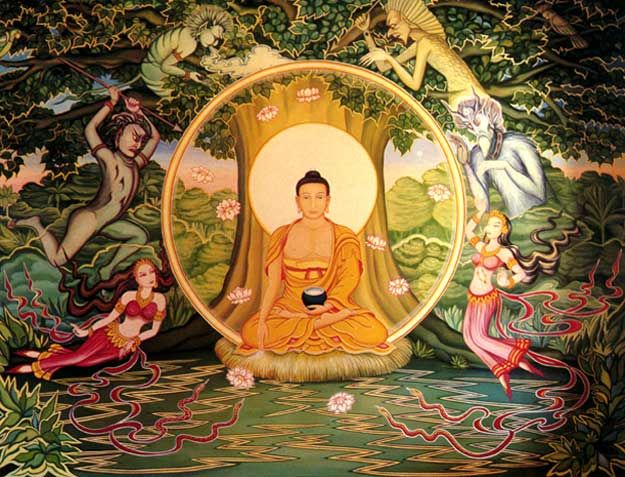For Buddhists, the Buddha is a model that provides inspiration. He walked the same path we walk and overcame many obstacles to attain enlightenment and free himself from the confusion that is samsara.
The historical Buddha left the gourmet food and dancing naked girls of his palace to work on freeing himself from suffering. He shopped around for different teachings and sat with many different teachers. Before he sat under the Bodhi Tree, where he attained enlightenment, he starved himself and probably did some terribly painful yoga poses.
In some ways we look at the Buddha as a model of hard work. After all, if you are going to pursue this path, it takes work. You don't just show up in front of a teacher and wait for him to waive a magic wand that frees you from suffering. You have to put in your own effort to
study, to observe and to practice.
So the other day, when one of my teachers said something about the Buddha letting go of his project, it struck a chord in me. He said that at some point "the Buddha got over the sense that he had to fix himself." In other words, the Buddha stopped trying to make himself the Über-meditator. He realized he could just be. Then he attained enlightenment.
The reason this point strikes a chord in me is that I totally see myself as a project. Intellectually, I understand that the project mentality is one of the roots of my suffering. Still, I haven't been able to let go of the project mentality.
I'm always trying to have a great meditation session. I get annoyed when I realize I've just spent 5 minutes on the cushion thinking about what I'm going to eat for dinner. Outside of my spiritual practice, I'm always trying to be more fit, to be more smart, to be more effective.
I'm not saying there is anything wrong with exercising, honing the mind, or refining your meditation technique. But the "I'm not good enough yet" mentality stands between us and our happiness.
The Buddha decided that starving oneself as a spiritual practice was aggressive and fixated on the self. His hardcore starving friends berated him for being a food-eater. But the Buddha bravely chose "the middle way," which is not too tight and not too loose.
We could contemplate the idea of making our practice and life not too tight and not too loose. Instead of creating projects like getting more "good" stuff and throwing out "bad" stuff, we could observe our minds carefully. If we are feeling irritated, we could listen to this emotion and see if there is a spark of wisdom in there. If we are feeling joy, we could rest in that, rather than trying to figure out how to get more of it.
Buddha means "awakened one." Whether we identify as Buddhists or not, we could use his example to wake up to what is actually happening around us, instead of always wishing for a different situation. Every time you see a Buddha statue or a Buddha painting, you could use it to remind yourself to drop the project and just be.


No comments:
Post a Comment